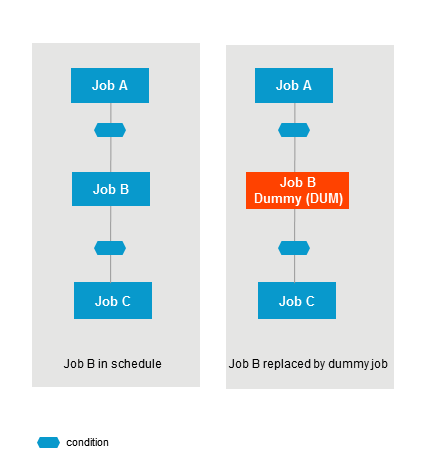The execution of a dummy job means that the job is running without job
control and without its own action within Entire Operations. Dummy jobs can
have an expected run time, which they will be waiting in the system. Dummy jobs
will always terminate with the state o.k..
This document covers the following topics:
You can directly submit and execute a dummy job by using a prerequisite checking routine. This increases the throughput of the Entire Operations Monitor and reduces overhead caused by changing job queues.
Permanent dummy jobs are declared with the job type Dummy Job (DUM) in the master job
definition.
Permanent dummy jobs will execute with the estimated elapsed time, which is defined for the job. This does not block any queues within the Entire Operations Monitor.
In principle, you can execute any type of job as a temporary dummy job. An active job that fulfills any of the conditions described under Dummy due to Condition is always executed as a dummy for a particular run.
Temporary dummy jobs with the job type Standard Job
(JOB) have a master JCL definition (see
Defining and Managing JCL for a
Job).
Temporary dummy jobs always have the execution time zero, regardless of which estimated elapsed time is defined for the job.
During its activation or during a prerequisite check, a job can be put
into the state temporary dummy job for the following reasons:
| Dummy due to Condition | Description |
|---|---|
| Definition | If the special type Execute as dummy
(D) is set in the master job definition, the JCL
definition can be maintained, but the execution as a dummy job can be
forced.
|
| Schedule | Depending upon the schedule of the network or upon a calendar, a
job can be submitted as a temporary dummy job on particular days.
For further information, see Maintaining Schedule Dependencies for a Job. |
| Prerequisite | It can be defined that the existence or non-existence of an
active prerequisite results in execution as a temporary dummy job.
For further details, see Possible References for Input Conditions. |
| Recovery Action | If a job is not to be submitted again in the case of a defined recovery action. |
| JCL check | Execution of the job control in the mode JCL check.
Thus, jobs (see Fields: Job Activation) or Job Networks (see Fields: Network Activation) are activated for the JCL check. |
| Empty JCL | If the loading process of the job control reveals that the JCL
is empty, then the job will be submitted as a temporary dummy job.
This state can result from the JCL generation by means of macro instructions, for instance. |
| Multiple Suffixes | If the activation is to take place by means of multiple suffixes: if the multiple symbol used does not contain any occurrences, then a dummy job will be activated as a placeholder in the network during activation. |
You can exclude a job from actual execution on certain schedule days without disturbing the job network structure. If a job is not to be activated, it can be converted into a dummy job just for this run. For example:

You can use the Schedule Dependency feature (see the section Schedule Maintenance) to define job activation or input condition usage to be checked only on certain days.
You can also define schedule dependencies for input conditions. For more information, see Defining Schedule Dependencies for an Input Condition in the section Schedule Maintenance.
For temporary dummy jobs, the End-of-Job actions are partially carried out as if the jobs were running in normal mode.
Several End-of-Job action definitions contain a field Execute if temporary dummy (described in the section End-of-Job Checking and Actions) which can be used to execute the End-of-Job action according to this definition if the job was executed as a temporary dummy job.
This section covers the following topics:
The End-of-Job actions are executed as follows (prioritized in top-to-bottom order):
| Conditions | Conditions are always set or deleted (even if the job is a temporary dummy job). |
|---|---|
| Dummy on account of Schedule | No further End-of-Job actions are executed. |
| Dummy for other Reasons | End-of-Job actions are executed. |
Actions that refer to the SYSOUT file are not executed if no SYSOUT file exists. This case will apply if the job is executed as a temporary dummy job.
End-of-Job action user exits will not be performed for temporary dummy jobs.
Running jobs are checked as to whether they have exceeded their predefined deadline time.
If this is the case, a message:
is sent to all mailboxes linked to the network;
is sent to Con-nect (if linked);
is written to the log;
appears in the List Active Jobs, Active Job List or List Active Jobs Job Active window.